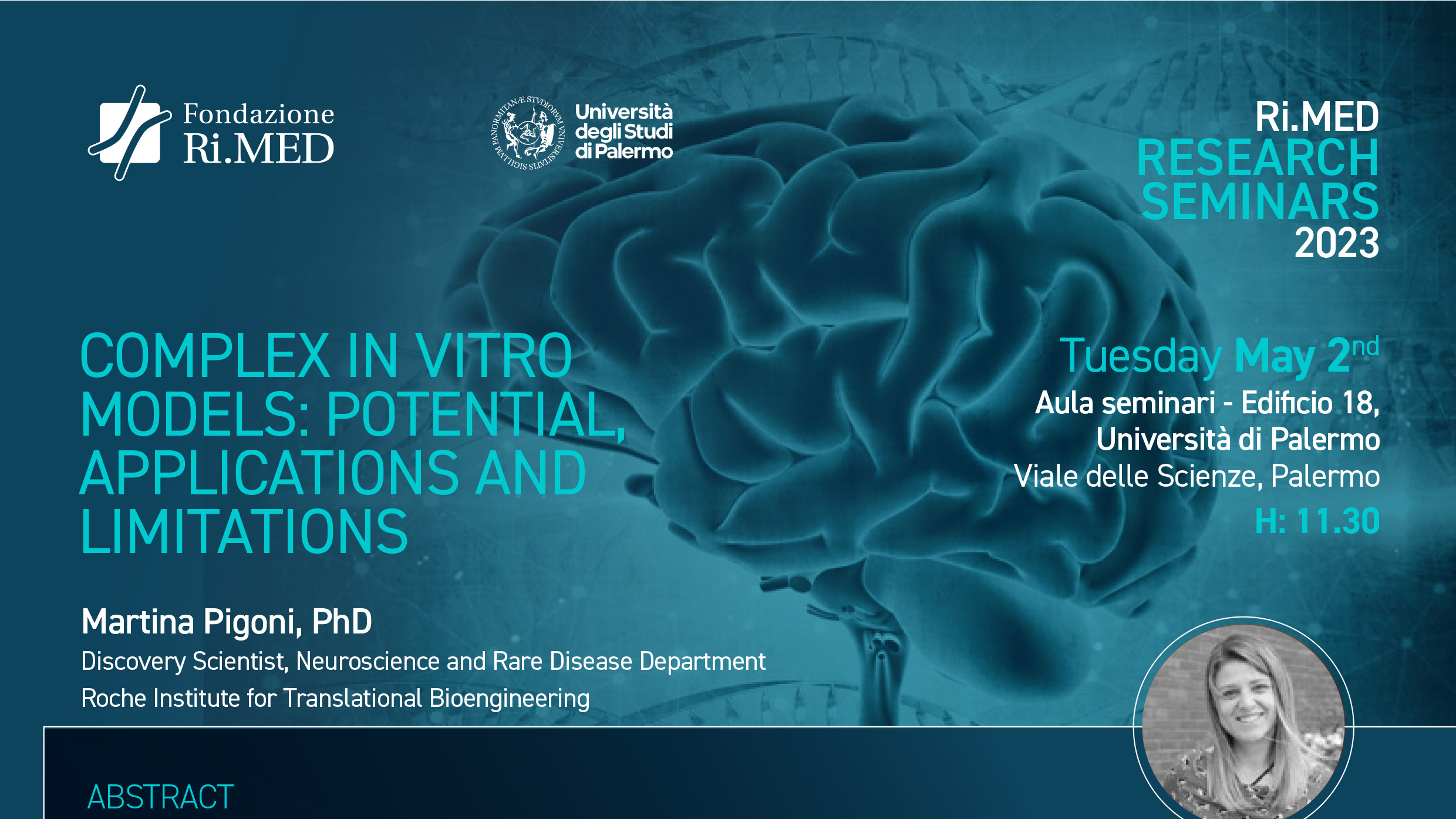A cycle of scientific seminars organized by the Ri.MED Foundation to bring here in Palermo some excellent names from the international scenario.
The cycle of seminars has started in March 2023 and will continue until the end of the year. The focus of the seminar will cover the various areas of Ri.MED research. For each seminar, experts from the international scientific community, will be invited to present their cutting-edge results in science.
The third seminar took place on Tuesday 2nd May h 11.30, Aula Seminari Edificio 18, Viale delle Scienze, Palermo:
“Complex in vitro models: Potential, Applications and Limitations”
Martina Pigoni, PhD Discovery Scientist in Neuroscience and Rare Disease department and at the Roche Institute for Translational Bioengineering, Roche (Basel, Switzerland)
Abstract
The limited access we have to human brain tissue makes the study of the brain a very big challenge, both in physiological and pathological conditions. We are now improving brain models that will help us to better understand cell-to-cell interaction and functionality. In addition to this, integrating the vascular component to the brain in vitro models or being able to recapitulate in vitro some aspects of the blood-brain-barrier (BBB) biology, represents an incredible opportunity for bio-distribution and drug delivery studies, overcoming the limitations of traditional animal models.
During the first part of my talk, I will focus on human brain organoids as an in vitro model of Autism Spectrum Disorder (ASD). I will describe some of their limitations and highlight their potential for studying mechanisms involved in neurodevelopmental disorders. Additionally, I am going to talk about the BBB, which heavily limits our drug delivery capability to the brain and therefore affects our chances of success in targeting neurodevelopmental and neurodegenerative processes. I am going to show some key improvements we have made in generating a better BBB in vitro model, which will allow us to study more complex cell interactions, to better model disease mechanisms and ultimately improve translatability in drug development.
Biosketch
Dr. Pigoni Martina is a Discovery Scientist at Roche (Basel, Switzerland), currently working in the Neuroscience and Rare Disease department and at the Roche Institute for Translational Bioengineering. Leveraging her in vitro expertise, she supports the establishment of complex in vitro models in the department. Additionally, Martina leads and supervises Alzheimer’s Disease (AD)-related and brain delivery projects.
Martina earned her Master’s degree in Medical Biotechnology summa cum laude at the University of Udine, Italy. During her studies, she spent several periods abroad joining the Minichello Lab at the University of Edinburgh (UK) and Gilthorpe Lab at the University of Umea (Sweden). During these experiences, Martina realized her passion for neurodegeneration and in 2014, she moved to Munich (Germany) at the DZNE (German Center for Neurodegenerative Diseases). Martina got her PhD from the Graduate School of Systemic Neurosciences GSN-LMU. During her PhD in the Lichtenthaler Lab, Martina investigated the molecular basis of AD and side effects related to BACE1 inhibitors. Besides working on novel molecular mechanisms involved in AD, Martina established an MSD platform for the detection of soluble BACE1 substrates in the CSF of AD patients. During her PhD, she was welcomed as a visiting researcher at the University of Melbourne and at Janssen Pharmaceuticals to further investigate the function of BACE1 substrates. In 2019, Martina joined the Arlotta Lab at the Stem Cell Department of Harvard University (USA), where she explored the potential of human brain organoids for in vitro disease modelling. In particular, her interest was to model molecular aspects of Autism Spectrum Disorder in vitro and to investigate potential convergence across ASD-related mutations.

